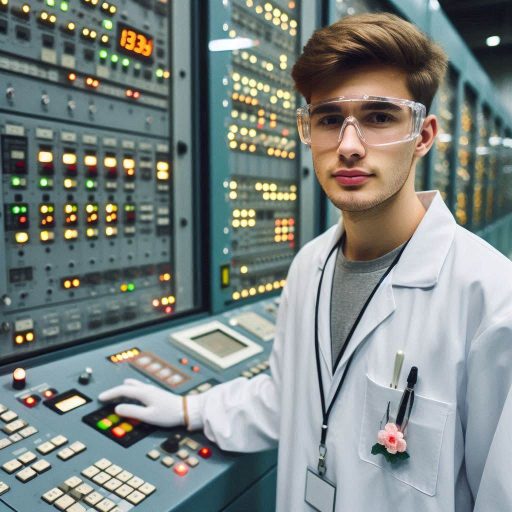Introduction
Interview tips are essential for securing nuclear science jobs.
The competitive nature of this field requires candidates to present themselves effectively.
Employers seek individuals who not only possess technical knowledge but also demonstrate strong communication skills.
Preparing for interviews helps candidates convey their expertise clearly and confidently.
Researching the organization and its projects shows genuine interest and commitment.
This knowledge allows candidates to tailor their responses to align with the company’s goals.
Practicing common interview questions is vital.
Candidates should be ready to discuss their experiences, skills, and relevant coursework.
Clear and concise answers can significantly impact the interviewer’s impression.
Additionally, showcasing teamwork and problem-solving abilities is crucial.
Nuclear science often involves collaborative projects, so demonstrating these skills can set candidates apart.
Candidates must also dress professionally and maintain a positive attitude during the interview.
First impressions matter, and a confident demeanor can influence hiring decisions.
Finally, asking thoughtful questions at the end of the interview shows engagement and enthusiasm for the role.
Preparing thoroughly for nuclear science job interviews is essential.
Candidates must stand out to increase their chances of success in this highly competitive field.
Research the Company
Importance of Researching the Company and Its Projects Related to Nuclear Science
Researching the company before a nuclear science job interview is crucial.
It shows your genuine interest and commitment to the role.
Understanding the company‘s projects allows you to tailor your responses during the interview.
This preparation helps you discuss how your skills align with their objectives.
Additionally, knowledge of the company’s history and reputation provides valuable context.
You can discuss specific projects or technologies they have developed.
This demonstrates your awareness of industry trends and challenges.
It also positions you as a proactive candidate who is well-informed.
Furthermore, researching the company prepares you to ask insightful questions.
Engaging with the interviewer about their work shows you are genuinely interested.
This approach creates a positive impression and sets you apart from other candidates.
How to Gather Information About the Company’s Goals, Values, and Recent Accomplishments
To gather information about a company‘s goals and values, explore their website.
Most companies have an “About Us” section detailing their mission and vision.
This section offers insights into their core values and long-term objectives.
Next, review the company‘s recent press releases and news articles.
This information highlights their latest projects, partnerships, and achievements.
It can also provide context about their industry standing and innovations.
Social media platforms like LinkedIn can be valuable resources.
Follow the company‘s page to stay updated on their activities and initiatives.
Engage with their posts to understand their current focus and priorities.
Networking is another effective way to gather information.
Reach out to current or former employees on professional platforms.
They can provide insights into the company culture, values, and recent accomplishments.
This firsthand knowledge can be invaluable during your interview preparation.
Ways to Demonstrate Knowledge of the Company During the Interview
Demonstrating knowledge of the company during the interview is essential.
Begin by mentioning specific projects or initiatives relevant to nuclear science.
Discuss how your skills and experiences align with these projects.
This approach shows that you have done your homework and understand their work.
Additionally, refer to the company‘s goals and values during your responses.
For example, if the company prioritizes sustainability, highlight your experience with eco-friendly practices.
This connection demonstrates your alignment with their mission and reinforces your suitability for the role.
Prepare thoughtful questions about the company‘s recent accomplishments.
Ask about specific projects mentioned in news articles or press releases.
This engagement showcases your interest and knowledge about their work.
You can also relate your past experiences to the company‘s projects.
If you have worked on similar initiatives, share your insights and results.
This discussion highlights your relevant experience and showcases your enthusiasm for contributing to their goals.
Finally, express your enthusiasm for the company‘s mission and values.
Articulate why you want to work for them and how you can contribute.
This passion can resonate with interviewers, making you a more memorable candidate.
Researching the company and its projects is vital for success in nuclear science job interviews.
Gathering information about their goals, values, and accomplishments prepares you to engage meaningfully with interviewers.
Demonstrating your knowledge during the interview enhances your candidacy and shows your genuine interest in the position.
By following these tips, you can increase your chances of standing out and securing your desired role in the nuclear science field.
Read: Profiles in Success: Leading Chemists of the 21st Century in the US
Understand the Job Requirements
Reviewing the Job Description and Qualifications Carefully
Before your nuclear science job interview, carefully review the job description.
This step helps you understand the key qualifications and expectations.
Look closely at the skills, experience, and educational requirements listed for the position.
Highlight the technical skills that are emphasized.
If the job involves reactor design, safety protocols, or radiation detection, note those specifics.
Understanding the job description thoroughly will guide your preparation and ensure your responses are relevant.
Additionally, pay attention to any soft skills or leadership qualities mentioned.
Employers in nuclear science may value communication, problem-solving, and teamwork.
Identifying these qualifications helps you tailor your interview answers.
Matching Your Skills and Experiences to the Job Requirements
Once you‘ve reviewed the job description, match your skills and experiences to the job requirements.
Start by making a list of your technical skills and professional experiences.
Compare these with what the employer is looking for.
For each key requirement, identify how your background aligns.
For instance, if the job calls for expertise in radiation safety, share examples of your experience with safety protocols.
Tailor your responses to show how your skills fit directly with the company‘s needs.
If you have gaps in experience, focus on transferable skills.
Highlight experiences where you‘ve applied similar knowledge or solved complex problems.
This approach shows that you can adapt and learn quickly.
Preparing to Discuss Specific Examples of Relevant Work
Being prepared to discuss specific examples of your relevant work is crucial.
Employers want to see how you‘ve applied your skills in real-world situations.
Choose a few projects or experiences that best demonstrate your qualifications.
For each example, provide context.
Explain the project‘s goals, your role, and the specific tasks you handled.
Use the STAR method‘Situation, Task, Action, Result‘to structure your answers clearly and logically.
Make sure the examples are directly related to the job you‘re applying for.
If the position involves nuclear research, share examples of past research projects.
If it‘s an engineering role, focus on projects where you designed or maintained nuclear systems.
Discuss the results or impact of your work.
Quantifiable outcomes, like improved safety measures or increased efficiency, make your examples more compelling.
This shows employers that you can deliver real value to their organization.
Practicing How to Showcase Your Qualifications
Practice is key to showcasing your qualifications effectively.
Review common interview questions related to nuclear science and rehearse your answers.
Practicing out loud helps you refine your responses and feel more confident.
Also, anticipate follow-up questions based on your examples.
Employers might ask for more details or inquire about challenges you faced.
Be ready to dive deeper into your experiences and explain how you overcame obstacles.
Confidence is essential.
Practice explaining complex technical details in a clear and concise way.
This will demonstrate your communication skills and ability to convey technical information to non-experts.
Preparing for a nuclear science job interview requires careful review of the job description and qualifications.
Match your skills and experiences with the job‘s requirements, and be ready to discuss specific examples of your relevant work.
By doing this, you can demonstrate your expertise and show employers that you‘re a strong fit for the role.
With the right preparation, you‘ll be well-equipped to succeed in your interview and advance in your nuclear science career.
Read: The Life and Times of a U.S. Physicist: A Day in Detail
Practice Common Interview Questions
Common Interview Questions for Nuclear Science Jobs
When interviewing for nuclear science jobs, you will likely face a mix of technical and behavioral questions. Some common questions include:
- What experience do you have working with radioactive materials or nuclear reactors?
- How do you ensure safety when handling radiation or nuclear waste?
- Can you explain a challenging technical project you‘ve worked on?
- How do you stay updated on the latest advancements in nuclear science?
- Describe a time when you solved a problem under pressure in a lab setting.
- What software tools are you proficient in for data analysis and nuclear modeling?
- How do you work as part of a multidisciplinary team on nuclear science projects?
These questions test both your technical skills and your ability to work in complex, safety-critical environments.
Understanding how to answer them confidently is essential.
Tips for Preparing Concise and Informative Responses
To prepare for your interview, practice crafting concise and informative responses.
Start by reviewing the job description to identify the key skills the employer is seeking.
Tailor your responses to highlight your qualifications for those specific requirements.
Use the STAR method (Situation, Task, Action, Result) to structure your answers.
Begin by explaining the context of the situation, describe the task or challenge you faced, outline the actions you took, and finish by sharing the outcome or result.
This approach ensures your responses are clear and relevant.
Keep your responses focused on the question being asked.
Avoid rambling or going off-topic, as this can dilute your key points.
Instead, aim to provide specific examples that demonstrate your knowledge, skills, and experience in nuclear science.
When discussing technical topics, explain your answers in a way that even non-experts can understand.
This shows you can communicate complex ideas effectively, which is an important skill in any scientific role.
Importance of Practicing Responses to Showcase Technical Knowledge
Practicing your responses is crucial to showcasing your technical knowledge and problem-solving abilities.
Rehearse your answers to common interview questions, ensuring you can explain concepts like nuclear reactions, safety protocols, and the use of specific tools or software.
When practicing, focus on confidently explaining technical concepts, such as how you worked with radioactive isotopes or how you conducted safety assessments.
This not only proves your knowledge but also shows you can think critically about real-world problems.
You should also practice responding to questions about troubleshooting or problem-solving scenarios.
Employers in nuclear science look for candidates who can remain calm and effective when facing complex challenges.
Practicing these responses will help you demonstrate your analytical thinking and ability to make informed decisions.
If possible, ask a friend or colleague to conduct a mock interview.
This will allow you to practice responding in a live setting and receive feedback on your performance.
Practicing in this way helps you refine your answers and improve your overall confidence.
In essence, preparing for an interview in nuclear science requires anticipating common questions and crafting concise, well-structured responses.
Practicing these responses allows you to effectively showcase your technical knowledge, problem-solving skills, and experience.
By being well-prepared, you increase your chances of making a positive impression and landing the job.
Read: Salary Ranges: What to Expect as a Physicist in the USA

Highlight Technical Skills
Technical Skills in Nuclear Science Interviews
When interviewing for nuclear science jobs, showcasing your technical skills is essential.
Start by identifying the key skills relevant to the position.
Common skills include radiation detection, nuclear chemistry, and reactor design.
Prepare specific examples that demonstrate your technical proficiency.
Use the STAR method‘Situation, Task, Action, Result‘to structure your responses.
This approach helps convey your experiences clearly and effectively.
Be sure to mention any certifications or coursework relevant to the position.
Highlight your training in nuclear safety protocols and regulatory compliance.
These credentials reinforce your knowledge and commitment to the field.
Showcasing Experience with Tools and Software
Employers value candidates with hands-on experience using industry-specific tools and software.
Before the interview, review the job description for required tools.
Familiarize yourself with any mentioned equipment, software, or methodologies.
During the interview, describe your proficiency with relevant tools.
For example, discuss your experience with Geiger counters, scintillation detectors, or dosimetry equipment.
Mention any specific software you‘ve used for data analysis, such as MATLAB or Python.
Provide examples of how you have applied these tools in your work.
This could include conducting experiments, analyzing data, or maintaining equipment.
Demonstrating your familiarity with these tools shows your readiness to contribute immediately.
Discussing Technical Projects and Research
Be prepared to discuss technical projects or research in detail during your interview.
Choose a few projects that highlight your skills and knowledge.
Focus on projects relevant to the position you‘re applying for.
When discussing a project, provide context about its objectives and significance.
Explain your specific role and responsibilities within the project.
Use the STAR method to describe the challenges you faced and how you overcame them.
Emphasize the outcomes of your projects, particularly any quantifiable results.
For example, mention how your research led to improved safety protocols or enhanced reactor efficiency.
These results demonstrate your impact and value as a candidate.
Preparing for Technical Questions
Expect technical questions during your interview.
These questions may assess your understanding of nuclear science principles and practices.
Review fundamental concepts, formulas, and safety regulations related to the position.
Practice answering common technical questions out loud.
This preparation will help you articulate your thoughts clearly during the interview.
Be confident in your knowledge and ready to elaborate on complex topics.
If you encounter a question you don‘t know, don‘t panic.
Respond honestly, and express your willingness to learn.
Employers appreciate candidates who show curiosity and a commitment to professional growth.
Effectively highlighting your technical skills and experiences is crucial during nuclear science job interviews.
Prepare specific examples that showcase your proficiency with relevant tools and methodologies.
Be ready to discuss your technical projects in detail to demonstrate your expertise.
By focusing on these areas, you can present yourself as a knowledgeable and capable candidate.
With proper preparation, you will feel confident in your abilities and ready to excel in your nuclear science career.
Read: Physics Specializations: Choosing Your Path in the U.S.
Transform Your Career Today
Unlock a personalized career strategy that drives real results. Get tailored advice and a roadmap designed just for you.
Start NowDemonstrate Teamwork and Communication
Showcasing Teamwork and Communication Skills in Nuclear Science Interviews
When interviewing for a nuclear science position, it’s important to highlight both your technical expertise and your teamwork abilities.
Employers in nuclear science seek candidates who can collaborate effectively and communicate complex concepts clearly.
Demonstrating these soft skills during the interview shows you can thrive in team-oriented and highly regulated environments.
Start by emphasizing your experience working in collaborative settings.
In nuclear science, teamwork is essential for safety, research, and problem-solving.
Mention any group projects, lab collaborations, or cross-disciplinary work you‘ve been part of, and explain how you contributed to the team‘s success.
Discussing Past Collaborations and Group Projects
Employers want to see that you can work well with others.
When discussing past collaborations, focus on your role within the team and how you contributed to achieving shared goals.
Be specific about the challenges you encountered and how your team addressed them.
For example, you might explain how you collaborated on a project to improve radiation safety measures in a lab setting.
Describe how you communicated with colleagues, delegated tasks, and resolved issues together.
Highlight the outcomes, especially if your teamwork led to significant improvements in safety, efficiency, or research results.
When talking about group projects, use the STAR method‘Situation, Task, Action, Result.
This method provides a clear framework for explaining your role in a way that shows both your teamwork and leadership skills.
By focusing on the actions you took and the results you achieved, you demonstrate your ability to contribute positively in a collaborative environment.
Demonstrating Effective Communication Skills
In addition to teamwork, communication is a critical skill in nuclear science.
You must be able to explain complex concepts clearly, whether you’re speaking to colleagues, supervisors, or regulators.
During the interview, make sure you demonstrate your ability to communicate technical information effectively.
One way to showcase this skill is by explaining a complex scientific concept or project you‘ve worked on.
Choose an example that‘s relevant to the position and practice explaining it in simple, understandable terms.
This shows the interviewer that you can break down difficult ideas for a wide audience, which is crucial in a field that requires precision and clarity.
Avoid using too much jargon, especially if the interviewer may not be familiar with your specific area of expertise.
Focus on how you would explain the concept to someone new to the field.
Your ability to communicate clearly and effectively will leave a strong impression.
Preparing for Questions About Communication and Teamwork
Expect questions about how you‘ve handled teamwork and communication challenges in the past.
Practice answering questions like, ‘Describe a time you worked with a difficult team member,‘ or ‘How do you explain technical findings to non-experts?‘
These questions are an opportunity to show how well you work with others and how effectively you can explain complex concepts.
Remember to stay calm, be concise, and provide specific examples from your experience.
Showcasing teamwork and communication skills during a nuclear science job interview is essential.
Be ready to discuss past collaborations, highlighting your contributions to group projects and how you navigated challenges together.
Demonstrating your ability to explain complex scientific concepts in clear terms will also help set you apart.
By preparing to discuss these soft skills, you‘ll present yourself as a well-rounded candidate capable of thriving in collaborative, technical environments.
This balance of technical knowledge and interpersonal skills will greatly enhance your chances of success in the interview.
Dress Appropriately
Guidelines for Dressing Professionally for a Nuclear Science Job Interview
When preparing for a nuclear science job interview, your attire speaks before you do.
Dressing professionally shows respect for the company and the job you’re seeking.
It‘s essential to present yourself as both competent and trustworthy in such a high-stakes industry.
While different companies have varying cultures, a professional, conservative look is generally a safe choice.
For men, a well-fitted suit in neutral tones like black, navy, or grey is ideal.
Pair it with a crisp, white or light-colored dress shirt and a simple tie.
Avoid flashy patterns or bold colors.
Dark leather shoes, polished and scuff-free, complete the look.
Women can opt for a professional pantsuit or a knee-length skirt suit in neutral tones.
Pair it with a conservative blouse, avoiding bright colors or low-cut designs.
Closed-toe shoes with a modest heel are both practical and professional.
Accessories should be minimal.
A simple watch, subtle jewelry, and a professional-looking bag can elevate your outfit without being distracting.
Tips for Choosing Appropriate Attire That Reflects Company Culture
Understanding a company‘s culture is key to choosing the right attire for the interview.
Some nuclear science firms are more formal, while others embrace a business-casual environment.
Research the company beforehand.
Check the company‘s website, social media, or ask someone who works there to gain insight into their dress code.
For a more traditional company, stick to formal business attire.
However, if you know the company has a more relaxed atmosphere, you may opt for business casual.
In this case, men can wear dress slacks with a button-down shirt, and women can wear a smart blouse with slacks or a skirt.
Even in a casual setting, avoid overly casual attire such as jeans or sneakers.
It‘s always better to be slightly overdressed than underdressed.
Aim to appear polished and professional, even if the company‘s environment is less formal.
The key is to balance professionalism with a nod to the company‘s style.
The Importance of Grooming and Personal Presentation
While your clothes set the foundation, grooming and personal presentation are just as crucial.
Pay attention to personal hygiene.
Ensure your hair is neatly groomed and styled appropriately for the job interview.
Men should have a clean shave or neatly trimmed facial hair, and nails should be clean and trimmed.
For women, keep makeup minimal and natural-looking.
Avoid bold lipstick or heavy eyeliner.
Hair should be neatly styled and kept off your face.
Perfume and cologne should be subtle or avoided altogether to prevent overwhelming the interviewer.
A well-groomed appearance conveys attention to detail, an important trait in the nuclear science industry.
By presenting yourself well, you show that you respect the interview process and the high standards required for the job.
Ask Intelligent Questions
Importance of Preparing Thoughtful Questions for the Interviewer
Preparing thoughtful questions for the interviewer is a key part of any job interview, especially in nuclear science.
Asking insightful questions demonstrates your genuine interest in the role and the company.
It shows that you’ve researched the organization and are invested in understanding how you can contribute to its goals.
Thoughtful questions also reflect your curiosity and commitment to continuous learning.
By asking about specific aspects of the company, you position yourself as someone who seeks a deeper understanding of the field.
This curiosity aligns well with the technical and innovative nature of nuclear science jobs.
Furthermore, interviews are two-way conversations.
Asking questions allows you to assess if the company aligns with your own career aspirations and values.
This exchange helps determine whether the position is the right fit for both you and the employer.
Tips for asking about the company’s future projects, team dynamics, or professional development opportunities
Asking About the Company’s Future Projects
One effective approach is to ask about the company‘s future projects.
In the nuclear science industry, organizations often focus on research, innovation, and long-term initiatives.
Questions about upcoming projects show that you are forward-thinking and interested in the company’s direction.
For example, you could ask, “What major projects is the company planning in the next few years, particularly related to nuclear energy or safety?”
This question highlights your interest in the company‘s goals and how your skills could contribute to these future endeavors.
Asking about future projects also helps you understand how the company is positioned within the nuclear industry.
Knowing the company‘s long-term plans can give you insight into the potential for career growth and stability.
Inquiring About Team Dynamics and Collaboration
Another important area to explore is team dynamics.
Nuclear science projects often require collaboration among engineers, physicists, and other specialists.
Understanding the company‘s team structure and how teams work together can help you gauge your fit within the organization.
You might ask, “Can you tell me more about the dynamics of the team I would be working with?”
This shows that you value collaboration and want to ensure you‘ll thrive in a team-oriented environment.
It also helps you understand how projects are managed and whether the company’s work culture supports innovation and communication.
Asking about team dynamics also demonstrates your interest in building strong working relationships.
It reinforces your collaborative mindset, a critical skill in the field of nuclear science, where multidisciplinary teamwork is essential.
Exploring Professional Development Opportunities
Questions about professional development opportunities signal your ambition and desire for growth.
Employers in nuclear science often value candidates who show a commitment to advancing their skills and knowledge.
You could ask, “What opportunities for training or professional development are available for employees?” This shows that you are proactive about your career development.
It also indicates that you want to stay updated on the latest advancements in the field.
Inquiring about training programs or mentoring opportunities also gives you a better understanding of how the company supports its employees’ growth.
This information can be crucial in deciding whether the position aligns with your long-term career goals.
The Impact of Asking Insightful Questions
Asking insightful questions leaves a strong impression on the interviewer.
It shows that you‘ve thought carefully about the role and are genuinely invested in the opportunity.
Thoughtful questions can set you apart from other candidates by highlighting your critical thinking skills and enthusiasm for the field.
By engaging in a meaningful conversation, you also create a lasting impression of professionalism and preparedness.
Interviewers often remember candidates who show curiosity, especially when the questions reflect an understanding of the company’s goals and challenges.
In closing, preparing thoughtful questions for your interview demonstrates genuine interest in the company and the position.
Asking about future projects, team dynamics, and professional development opportunities shows you are forward-thinking and career-oriented.
By engaging in meaningful discussions with the interviewer, you leave a positive impression that can enhance your candidacy.
Thoughtful questions not only help you learn more about the role but also showcase your proactive approach to success in nuclear science.
Follow-Up After the Interview
Importance of Sending a Thank-You Email or Note After the Interview
Sending a thank-you email or note after a nuclear science job interview is essential.
It demonstrates professionalism and reinforces your interest in the position.
Employers appreciate candidates who take the time to express gratitude.
This simple gesture can make a lasting impression and set you apart from other applicants.
A well-crafted thank-you email shows that you value the opportunity to interview.
It also reinforces your communication skills, which are vital in nuclear science roles.
By sending a follow-up note, you remind the interviewer of your qualifications and enthusiasm for the job.
Thank-you emails also provide an opportunity to highlight key points from the interview.
If there was a particular question or discussion that stood out, you can briefly revisit it.
This helps keep the conversation fresh in the interviewer‘s mind and reinforces your suitability for the role.
Tips for Expressing Gratitude and Reiterating Interest in the Position
When writing your thank-you email, be concise and thoughtful.
Start by expressing gratitude for the interviewer’s time and the opportunity to learn more about the position.
Personalize the message by referencing specific topics or questions discussed during the interview.
For example, you can mention how the conversation increased your excitement about the job.
Highlight any particular aspects of the company or role that align with your skills and interests.
This shows that you were engaged during the interview and are serious about the opportunity.
It’s important to reiterate your interest in the position.
Let the interviewer know that the interview solidified your desire to contribute to the team.
By restating your enthusiasm, you remind them of your commitment to the role.
Also, keep your tone positive and professional.
While enthusiasm is important, avoid coming across as overly eager or desperate.
A confident and respectful tone is key to leaving a favorable impression.
Following Up with Additional Materials or Information
If the interviewer requested any additional materials or information during the interview, follow up promptly.
This could include transcripts, references, or clarification on a specific topic.
Timely follow-up demonstrates responsibility and attention to detail, qualities that are highly valued in nuclear science positions.
In your thank-you email, mention that you are providing the requested materials or information.
This shows that you were attentive during the interview and are taking the process seriously.
If you need more time to gather the materials, inform the interviewer and provide a timeline.
When submitting additional documents, ensure that they are properly formatted and complete.
Any errors or missing information could reflect poorly on your candidacy.
Attention to detail is crucial in the nuclear science field, so double-check everything before sending it.
On a final note, sending a thank-you email after a nuclear science job interview is an important step in the hiring process.
It demonstrates professionalism, expresses gratitude, and reinforces your interest in the position.
Additionally, following up with any requested materials showcases your responsibility and attention to detail.
By taking these steps, you can leave a positive, lasting impression on the interviewer and increase your chances of securing the job.
Uncover the Details: Top Companies Hiring Plant Scientists
Conclusion
Preparing for a nuclear science job interview requires attention to detail and strategic planning.
Start by researching the company and its projects thoroughly.
Understand their mission, values, and recent developments in the nuclear field.
This knowledge demonstrates your genuine interest and alignment with the organization’s goals.
Practice articulating your relevant skills and experiences clearly and concisely.
Highlight specific examples that showcase your expertise in nuclear science.
Be ready to discuss your technical skills, problem-solving abilities, and teamwork experiences, as these qualities are essential in the field.
During the interview, maintain a confident demeanor and strong body language.
Make eye contact and engage with the interviewers.
Listen carefully to their questions and respond thoughtfully, ensuring your answers align with the job requirements.
Thorough preparation is crucial for success.
Familiarize yourself with common interview questions and rehearse your responses.
This practice can help reduce anxiety and improve your delivery.
Utilizing these tips can significantly enhance your chances of securing a nuclear science job.
Emphasize your passion for the field and readiness to contribute.
Approach each interview with confidence and a positive attitude to make a lasting impression on potential employers.
Transform Your Career Today
Unlock a personalized career strategy that drives real results. Get tailored advice and a roadmap designed just for you.
Start Now



